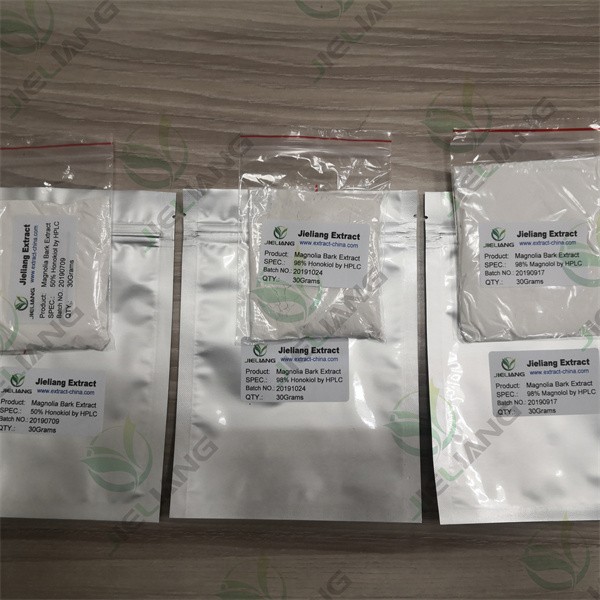Magnolia officinalis is a herb commonly used in traditional medicine. it is listed in the directory of National key protected wildlife. The bark from root or stem contains the active compounds honokiol and magnolol, which may help reduce inflammation, anxiety, or depression.
Magnolia bark extract has shown anti-inflammatory and anticancer effects in lab and animal studies, it is usually exrated from tree bark or root bark, and Magnolia
 Magnolol (Molecular formula: C18H18O2, CAS NO.528-43-8 ) is an organic compound that is classified as lignan. It is a bioactive compound found in the bark of the Houpu magnolia (Magnolia officinalis) or in M. grandiflora.
Honokiol (Molecular formula: C18H18O2, CAS NO.35354-74-6) is an another lignan isolated from the Magnolia officinalis bark.
Magnolol (Molecular formula: C18H18O2, CAS NO.528-43-8 ) is an organic compound that is classified as lignan. It is a bioactive compound found in the bark of the Houpu magnolia (Magnolia officinalis) or in M. grandiflora.
Honokiol (Molecular formula: C18H18O2, CAS NO.35354-74-6) is an another lignan isolated from the Magnolia officinalis bark.
Application
1) Anti – inflammatory, antibacterial, anti-pathogeny microorganism
The Magnolia officinal bark extract is rich in phenolic compounds including Magnolol and Honokiol as two main ingredients, which have remarkable antibacterial activity in inhibiting gram-positive bacteria, acid resistant bacteria and filamentous fungi, and a more significant effect on streptococcus mutans, with a strongest inhibitory effect on staphylococcus aureus. So it widely used in mouth health and personal care products, such as acne treatment, anti – inflammation, whitening, sunscreen and anti – aging creams.
2) Muscular flaccidity
The Magnolol, Isomagnolol has muscular flaccidity.
3) As an antibiotics and stimulating animals appetite
It has a better rehabilitating effect on gastric ulcer and anti-cancer of livestock. It is capable of avoiding comprehensive complicating diseases due to porcine reproductive and respiratory syndrome (PRRS), eperythrozoonosis and toxoplasmosis. It has strong palatability and is capable of improving feed intake and Promoting growing. It is natural and green without any chemical medicines or hormone.
COA and Chromatogram For Reference









